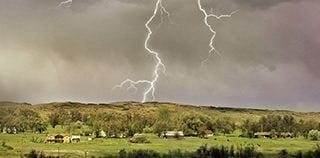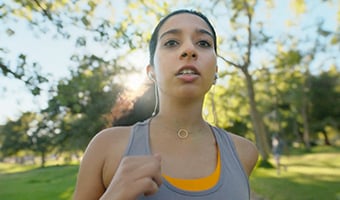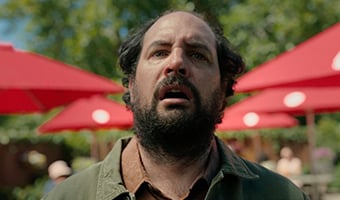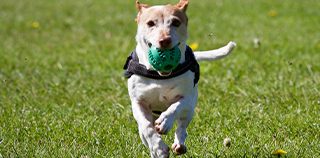Hay fever in children is incredibly common. In fact, a study1 by Allergy UK in partnership with Kleenex found that 84% of children with hay fever experience symptoms more than one day per week April-August, and 75% experience symptoms every year.
Whether your child has experienced hay fever symptoms before or not, it’s a good idea to prepare early and be ready to help them as much as possible. Understanding what type of pollen they’re allergic to can really help them avoid triggers. Take our quick hay fever and allergy test to find out.
With 49% of the UK population suffering from hay fever symptoms every year, we thought we’d research some useful advice on how to manage those hay fever symptoms in children. With the help of our partners at Allergy UK, we’ve put together a collection of guidance, from medication to exposure tips and monitoring pollen.
What causes hay fever in children?
Hay fever in kids is commonly caused by pollen from grasses, trees, and plants. While hay fever is typically thought of as a summer complaint, the pollen season in the UK starts much earlier in the year, during the spring. That means that hay fever can be at its peak in the months when your kids are at school, playing out on the newly mown school field and spending time in classrooms with the windows flung open. These aren’t the ideal conditions for managing hay fever symptoms, but you’re not entirely powerless to help.
Tips for supporting your kids and encouraging them to take their hay fever medication
You know it’s going to be a bad hay fever day when your kids wake up with a stuffy nose and puffy eyes. Not only is it stressful for you as a parent as you send them off to school with pockets full of tissues, but your kids are most likely also not having a great time when suffering hay fever symptoms .
In fact, over a third (37%) of parents reported that their child felt embarrassed by their hay fever symptoms in social situations. Some 34% felt that their kids were using other excuses to avoid going outside, which isn’t helpful on those busy school mornings.
Kids need to feel that their parents and peers understand their hay fever symptoms so they don’t have to try and hide a runny nose. Try to talk to your children about how you can tackle those pesky pollen particles together.
Allergy UK has a few useful suggestions:
- Praise your kids after they take their hay fever medication, as this lets them know you recognise it’s uncomfortable for them.
- Mention to others how well your child is coping while they are present. This can help boost their self-esteem.
- Try to distract and reward younger children when they take their eye drops. For example, you could let them put a star on their behaviour chart, or give them a small treat. You could also suggest a game - for example, I Spy - that can be played while you do it.
- Try to role play with your younger children using toys. Talk them through what’s going to happen and let them repeat the procedure on their toy after giving them their own eye drops.
How to help manage hay fever in children at school
When you send your kids out the door or drop them off at the school gates, you might be concerned about how they’re going to manage their hay fever symptoms during the day. Of course, every parent worries about their kids, but hay fever is one more thing on your mind, especially on summer days. In this instance, being pro-active is the best way to manage your concerns; there are a few children’s hay fever remedies you can follow and things you can do to help prep your kids (and their sinuses) for the day ahead.
Here are some tips to help your child get through the summer term:
- Use a daily non-sedating antihistamine. These come in both liquid and tablet form, so are handy if your kids don’t like taking capsules.
- Monitor pollen forecasts so you know when your children should start taking their allergy medication. This can also help with planning time spent outside.
- If you drive your children to school, keep windows closed and have the air-con on to prevent pollen exposure. This can be tricky on those sticky summer days, so perhaps have the air-con running a few minutes before you get in the car.
- Ask teachers to keep windows closed to avoid classroom pollen exposure (but bear in mind they will need to take the needs of the entire class into consideration, and if the school doesn’t have air-con to keep classroom temperatures down, this might not be feasible).
- Invest in a pair of wraparound sunglasses and a hat to keep pollen out of your kid’s eyes and off their face when they are outside. This might not be the trendiest look for them, so involve them in choosing the accessories they like, and explain how it will help keep away pollen particles.
- Help your child get a good night’s sleep by keeping windows closed overnight in their bedroom. Make sure they wash their hair and face and change their clothes before they get into bed so that pollen isn’t transferred on to their sheets.
- Make sure their hay fever medication is available throughout the day. This might mean handing it to a teacher or school nurse who can care for them at school.
Managing hay fever in kids in Physical Education (PE) lessons and sports day
PE and sports days can also cause a lot of worry for children living with severe hay fever. They want to join in with their friends but are either stuck inside or can’t enjoy themselves due to their troublesome symptoms. Nobody wants to run a hurdle race with watery eyes and a tight chest.
Here are some tips to help your child's hay fever symptoms when taking part in outdoor activities:
- Ask the school if some PE lessons can remain inside when pollen counts are high.
- Ask the school if they can avoid outdoor activities being scheduled early in the morning and in the evening, when pollen counts are higher. It might also be a good idea to suggest that teachers keep track of local pollen counts themselves so they can adapt lesson plans accordingly.
- Encourage your child to wear protective glasses and a hat with a large brim to help keep pollen particles from their eyes and face.
- Make sure your child has their allergy medication with them wherever they’re exercising.
- If the school has a shower room, encourage them to take a shower after PE and before they change back into their uniform.
- Give your child a separate bag for their sports clothes so that pollen particles are contained.
- Take a shower every day before they go to bed.
Managing hay fever in babies and toddlers
When your children are younger, you may not know how to start tackling toddler and baby hay fever symptoms. It can be especially stressful when they’re small as they can’t take many over-the-counter children’s hay fever remedies – but that doesn’t mean you can’t do anything to help. In fact, there are a number of tips you can follow to help minimise your child’s contact with allergens.
- Stay indoors until after midday (if possible). This will reduce pollen exposure.
- Avoid going out on windy days or after thunderstorms.
- Try to get them to wear sunglasses to protect their eyes.
- Put them in the bath or shower when you get home, and change their clothes.
- Gently wipe their eyes and face with cool, clean water and cotton wool frequently throughout the day.
- Keep them inside when the grass is being cut.
- Consider planting a low allergen garden in your home.
- Keep windows closed both at home and in the car. When you can, use your car’s air conditioning.
- As much as they make for great days out, don’t picnic in parks or in the country during pollen season.
- Try to plan family holidays out of pollen season, or holiday at the seaside.
- Remove any plants your kids might be sensitive to from your garden or outside their bedroom window.
- Carry a supply of tissues. Kleenex Allergy Comfort Tissues are extremely soft, ultra-absorbent, and hypoallergic - they also have the Allergy UK Seal of Approval!
Other things to consider with hay fever management
Symptoms and sleep
Hay fever symptoms in children such as sneezing, an itchy, blocked, or runny nose, and irritated and watery eyes, can lead to disrupted sleep. This impacts alertness and your child’s ability to concentrate, which doesn’t pair well with sitting in a classroom all day. Disrupted sleep can also mean kids become more irritable throughout the day, which is something you and their teachers would probably like to avoid.
Hay fever and asthma in children
It’s common for children with asthma to also have hay fever . If this is the case for your kids, it’s important that hay fever symptoms are managed with the right treatments. There is a risk that uncontrolled hay fever may have an impact on their asthma, aggravating symptoms. However, if both are well-managed, there shouldn’t be a need to worry – just keep an eye out or consult your doctor if in doubt.
What medication to use to manage hay fever
Medication can be used to manage hay fever symptoms in your kids but, if you’re concerned, you should always speak to your child’s doctor so they can prescribe the correct treatment. Types of medication that may be prescribed include:
- Antihistamine syrup for small children
- Antihistamine tablets for older children
- Antihistamine nasal sprays and eye drops. These can help soothe irritated noses and eyes
For more detailed information on treatments and medications, please click here.
You should consult your GP for more information on hay fever treatments and medication to find out which ones are suitable for your kids and their symptoms.
Please make sure to follow proper instruction to take the medication. If the hay fever symptoms are not improving after the treatment, you should consult with your GP.
Don’t suffer in silence with your child’s hay fever. There are many different options available to help alleviate hay fever symptoms in your child and start making things a little bit more manageable for both of you. Making sure you’re tracking pollen levels in your area is a good place to start, as it can help you plan summer days out and prepare for the mornings when your kids will need their medication. You should also speak to your pharmacist so they can prescribe the best treatments and, if you’re still unsure, talk to your GP.
For more detailed information on hay fever in children, please visit the Allergy UK website - click here.
For more information on living comfortably with allergies, please visit the Allergy UK website - click here.
All content and advice is provided on behalf of Allergy UK in partnership with Kleenex®
1 Research details:
In March and April 2021, 7,242 respondents were contacted by Sapio Research. Results on the incidence of hay fever are taken from looking at the proportion of people that were screened out of the survey versus those who continued because they suffered with hay fever (3,541).
The full survey with sufferers was then conducted among 3202 Hay fever sufferers and 339 Parents with children who suffer from hay fever, from an initial 7,242 respondents. Interviews were conducted online by Sapio Research in April 2021 using an email invitation and an online survey. Results of any sample are subject to sampling variation. The magnitude of the variation is measurable and is affected by the number of interviews and the level of the percentages expressing the results. In this particular study, the chances are 95 in 100 that a survey result does not vary, plus or minus, by more than 1.4 percentage points from the result that would be obtained if interviews had been conducted with all persons in the universe represented by the sample.
FAQs
Is hay fever contagious?
No, hay fever is not contagious. It is caused by an allergic reaction some people have to pollen particles, so it’s not infectious.
What causes hay fever?
Hay fever is caused by an allergic reaction certain people have to pollen particles expelled by plants, grasses, and trees when it gets into their eyes, nose, and mouth.
Why have I suddenly developed hay fever?
Your immune system changes constantly throughout your life, so it’s not impossible to suddenly develop hay fever in adulthood. An unusual onset of hay fever can also be caused by increased pollen levels.
This article has been expertly reviewed by Jin Zhang, Director of Global Medical Affairs at Kimberly-Clark
The content should not substitute medical advice from your personal healthcare provider. Please consult your healthcare provider for recommendations/diagnosis or treatment













